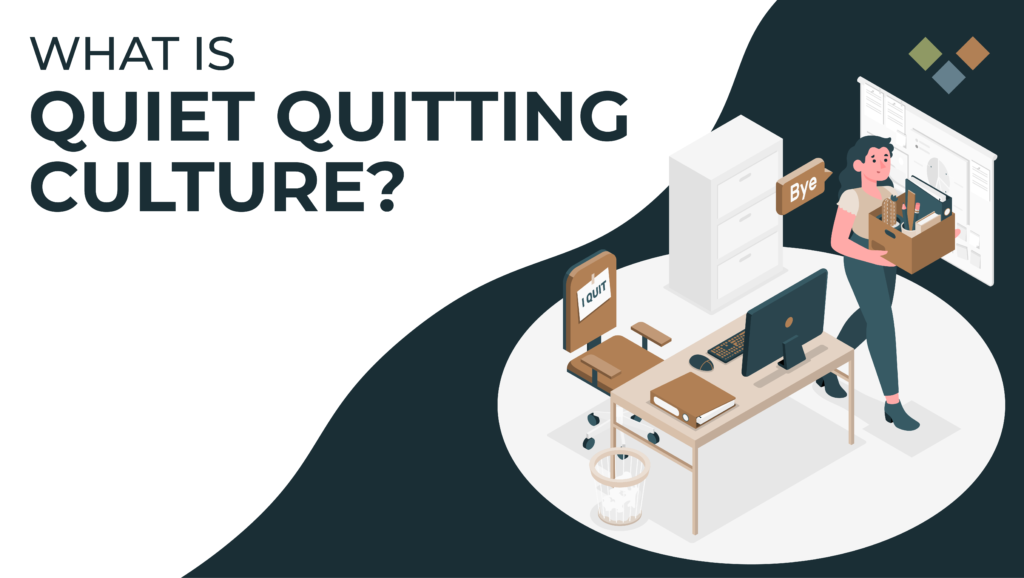
Quiet quitting is becoming more popular as an apparently silent but forceful protest against this unsustainable way of living and working. This is somewhat different from someone “checked out” because they are frustrated, overwhelmed, or already have one foot outside the door. Instead, quiet quitting is more of a collective movement, where people are choosing themselves over the organization in an effort to safeguard their most important priorities: their important connections and their own mental health, rather than giving in to their circumstances.
What is Quiet Quitting Culture?
A new trend called “quiet quitting” has taken over social media sites like Twitter and TikTok in recent months. The expression doesn’t mean that employees actually quit their employment; rather, it means that they perform the bare minimal duties expected of them. This may involve arriving at work on time for your shift, requesting overtime pay, declining ambitious initiatives, distancing yourself from your work, and/or establishing firm work-life boundaries.
While some see the necessity to achieve a healthy work-life balance through quiet resignation, others view it as dishonest, lazy, and maybe suggestive of a larger downward trend.
Harvard Business School professor Ranjay Gulati claimed that the silent resignation should actually be viewed as a “great rethink” in which people assess their options for both their personal and professional lives. And some people think that such an assessment has long been overdue.
As with the great resignation, the workplace culture has profoundly changed after almost two years of remote or mixed employment. Gaining popularity in response to pandemic-induced burnout, quiet quitting is definitely having a moment; especially among young people who, in many ways, have suffered through the worst of these surreal times.
Some would say “quiet quitting” isn’t a thing because the idea of ‘quitting’ or the meaning behind the word has a sense of resignation attached to it, and the post-pandemic climate has left everyone’s financials in tatters, so can they really quite quit?
Is there a way to combat this?
Employees had the chance to decide what they really wanted to do for a living during the COVID-19 epidemic, as well as for which company. As it turned out, many people’s current jobs weren’t what they desired, leading to an increase in resignations across a variety of industries and the creation of several job opportunities.
Job seekers now have the advantage of searching for positions that offer greater compensation, more flexibility, and better cultures because there are so many openings. Employers offer high pay and enticing benefits to entice workers away from their existing positions because they are aware of the intense competition for top talent.
A substantial difference maker would be to take quiet quitting as a cue for a culture reset, starting with these 3 pivotal areas:
Belonging
Having a sense of belonging goes beyond simply being a part of something. It entails making workers feel valued and cherished. People who don’t feel like they belong in an organization’s culture may feel alone, disengaged from their work, and detached from the business as a whole (remote employees may be especially susceptible to this). Disengagement breeds disconnection, which can damage team morale and eventually have an effect on retention.
Inclusion
People are psychologically comfortable to bring their whole self to work in an inclusive workplace culture because they know their unique voices and lived experiences will be acknowledged and valued. Leading by example and holding themselves and others firmly accountable for acting in ways that respect intersectionality and diversity is the first step in developing an inclusive culture (how social identities interact with systems of power that oppress some and benefit others). Visit our Blog – ‘Here is why your company needs Inclusive Hiring’ to give yourself a good read on all the reasons you need Inclusive Hiring.
Wellness
The well-being of employees transcends personal accountability. Organizations must go above and above for their employees, offering both resources and flexibility to aid in their development of self-efficacy and resilience. This is important. Because workers are legitimately rejecting to continue giving up their health, happiness, and dignity for the sake of their company.
The excessive demands and standards. The year-round pursuit of more with little to no sponsorship or support. The lack of concern for mental health. The emphasis on judging people solely by their output rather than their true character. Before silent resigning took hold, it would have been ideal if firms had realized this on their own. But it didn’t go like that. Because of this, workers have decided to effect change through their own productivity—or lack thereof.
Conclusion
Although it may only be a passing internet craze, employees’ daily struggles are the root of the phenomenon known as “quiet quitting.” All parties should take into account that the era of rethinking work culture is here. It involves acknowledging that there is a problem and committing to solving it rather than doing away with it altogether. With a trustworthy RPO partner like Bohiyaanam, we are able to inculcate training in understanding these problems and helping employees and employers find a better balance between each other.
Are you ready to get started?

